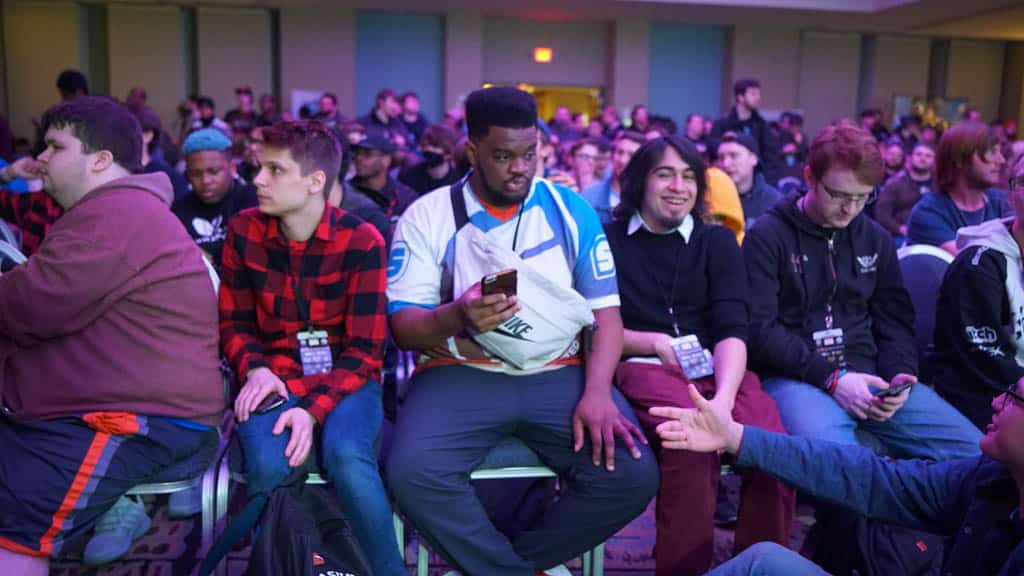For 42 years, Stage One at Burbank Studios was home of the Tonight Show.
Johnny Carson and Jay Leno used the stage to entertain millions with their sharp wit and peculiar antics.
They shared the stage with presidents, heads of state, and world-famous celebrities.
Celebrities still come. But they are not there to interview or perform anymore.
Stage One has been retrofitted with two long tables, each with six chairs.
The tables hold a dozen high-powered computers between them, and three massive 200-sq. ft. screens hang above.
The bandstand has been replaced by a bank of analyst desks.
One backstage room now houses “shoutcasters,” who provide play by play on the event.
And another has “observers.” These people watch every movement made by the occupants of those 12 chairs.
Stage One is now host to live broadcast video game tournaments, better known as “eSports.”
For those paying attention, new media has replaced old media almost overnight. And there’s lots of money to be made in this changing of the guard.
Kids Are Already Training for the Next NFL
The entire setup at Burbank Studios is for professional digital athletes.
These athletes are mostly young adults between 17 and 26 who compete live in front of an audience of millions.
They’re participants in the Overwatch League – a video gaming league with two divisions in 12 cities across the globe.
The game they are playing, Overwatch, is only a little over two years old. But it already has 40 million players.
More importantly, the game is raking in more than a billion dollars a year!
Owners of teams in the league include big players in sports, like Robert Kraft, (owner of the New England Patriots) and Francesco Aquilini (owner of the NHL’s Vancouver Canucks).
Nate Nanzer, vice president of Activision Blizzard and commissioner of the Overwatch League, said…
“There’s going to be kids who can say ‘I play professional Overwatch for the same guy that Tom Brady plays for.’”
Steve Bornstein was once president and CEO of ESPN, responsible for much of its success in the early ‘90s. Later he became the president of ABC Sports, and a short while later, the president of ABC. Then he moved on to become the president and CEO of the NFL Network.
Now, he’s the chairman of eSports at Activision Blizzard.
A reporter asked why he decided to shift his career from traditional sports to eSports.
Bornstein borrowed a quote from all-time hockey great Wayne Gretzky, who said:
“Skate to where the puck is going.”
“When I left the NFL, the only thing I saw that had the potential to be as big was the eSports space,” he told Wired Magazine. “What fascinated me was just the level of engagement, the fact that we measure consumption in billions of minutes consumed.”
When Bornstein joined ESPN in the early ‘80s, it was only four months old.
Critics of the new network slammed the channel. Who would watch a channel devoted entirely to sports?
Fast forward and that thinking sounds absolutely crazy today.
So if you’re asking yourself right now, who would fill a stadium or watch a channel devoted entirely to video games? You will look back and see how crazy that sounds.
For Blizzard’s live broadcast of the Overwatch League, the answer to who would watch is easy: LOTS of people.
And huge emphasis on the LOTS.
The league reached nearly 11 million unique viewers across all platforms during its Grand Finals earlier this summer. And it reached an average of 280,000 viewers per minute on the popular streaming platforms Twitch and MLG (Major League Gaming) during its opening week.
If you don’t recognize the names Twitch and MLG…
You will. Very, very soon.
A Whole New Concept of Sports Is Kicking Off
Just last week, Nike signed its very first endorsement deal with an eSports athlete.
Jian “Uzi” Zihao will be featured alongside NBA Superstar LeBron James in the latter’s newest marketing campaign, “Dribble & _____”.
“Uzi” plays for the Chinese League of Legends team Royal Never Give Up (RNG).
RNG also has endorsement deals with some companies you may have heard of before, such as Mercedes-Benz and KFC.
This may be the first time you’ve seen eSports athletes advertised alongside big-name traditional sports athletes.
But it won’t be the last.
A staggering 380 million people will watch video games being played this year, a gold mine for advertisers.
But the opportunity in video games is far, far bigger than that.
If eSports are the new NFL – like Bornstein said – then video games are the new sports.
The numbers show it.
More than 2.3 billion people will play video games this year, with 200 million more coming online in the next two years.
And the time they spend playing video games has risen by 50 percent in the past decade and a half.
So what is propelling new media to replace old media now?
From Jay Leno to Activision Blizzard
First, demographics are changing fast.
The generation that watched Carson and Leno is shrinking.
The next generation – millennials – have become the largest population group in the United States. And instead of watching TV, they’re playing video games.
It’s not just millennials who are turning to video games in droves. It’s also every generation after them.
More than half of Gen Zers play video games for several hours each day.
And older people are picking up video games too. The average age of a video gamer is now 37.
From Pong to Fortnite
New models and modes of gaming have made video games more accessible than ever. And to people from every generation.
It’s much cheaper to play a game now than it is to watch cable TV or go to the movies.
The old model of expensive one-time game purchases has transformed into a free-to-play model. This is where companies make money selling in-game items.
The clunky old arcade consoles – and even the newer, expensive Xboxes – are fading out in favor of mobile and PC games. The up-front cost for gamers is now a fraction of what it used to be.
A Waste of Time to a Profitable Way of Life
Meanwhile, culture has already shifted.
Video games used to be considered a waste of time and of life.
Now, they have become an activity that people want to invest in.
And if you’re not paying attention, you’ll be too late to make money on the massive tidal wave of profit coming in video games.
While kids are still in middle and high school, they’re dedicating their lives to gaming.
For example, Stefano Disalvo plays on the Blizzard Overwatch League. At 16, he decided he wanted to become a professional eSports player. He was still a high school student in Toronto.
This won’t be the norm.
It is the norm right now.
When something accessible becomes a way of life for the entire next generation, you want to invest in it – fast.
Video Games Are Eating the World
Think of the industries that were upended when the iPhone entered our lives: newspapers, TV, computers, music, photography, transportation… and now health care.
This shift in the marketplace towards video games is going to decimate entire industries:
- Instead of going to malls, young people will hang out and talk to each other inside of video games. Your kids or grandkids likely already do.
- Instead of going to the movies, young people will watch reruns of people playing video games.
- Instead of watching sports, young people will go to packed arenas and watch people play video games live. This is happening all over North America and Asia right now.
The global video game industry is expected to top $160 billion in 2020 – and continue annual double-digit growth rate for a decade.
It’s going to create juggernauts as big as Apple and Uber. And right now, a few of those future mega-companies are still tiny.
In tomorrow’s essay, we’re going to look at some of the players in the video game market that have already made it big.
And you’ll see just how they became massively successful.
We’ll start with one of the hottest games out there – Fortnite, owned by Chinese gaming giant Tencent…
Regards,
Katusa Research





